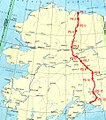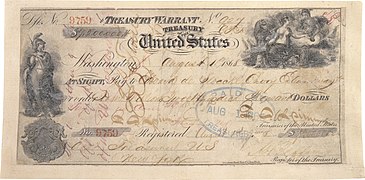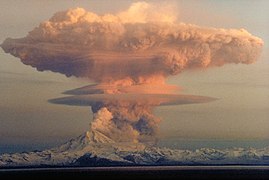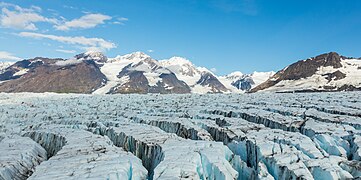
Back بوابة:ألاسكا Arabic Portal:Alyaska Azerbaijani Portal:Alaska Catalan Portal:Alaska German Portal:Alaska Spanish Portail:Alaska French Portal:Alasca Portuguese Portal:阿拉斯加州 Chinese
 Introduction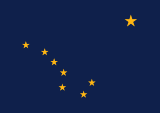   Alaska (/əˈlæskə/ ə-LASS-kə) is a non-contiguous U.S. state on the northwest extremity of North America. Part of the Western United States region, it is one of the two non-contiguous U.S. states, alongside Hawaii. Alaska is also considered to be the northernmost, westernmost, and easternmost (the Aleutian Islands cross the 180th meridian into the eastern hemisphere) state in the United States. It borders the Canadian territory of Yukon and the province of British Columbia to the east. It shares a western maritime border, in the Bering Strait, with Russia's Chukotka Autonomous Okrug. The Chukchi and Beaufort Seas of the Arctic Ocean lie to the north, and the Pacific Ocean lies to the south. Technically, it is a semi-exclave of the U.S., and is the largest exclave in the world. Alaska is the largest U.S. state by area, comprising more total area than the following three largest states of Texas, California, and Montana combined, and is the seventh-largest subnational division in the world. It is the third-least populous and most sparsely populated U.S. state, but is, with a population of 736,081 as of 2020, the continent's most populous territory located mostly north of the 60th parallel, with more than quadruple the combined populations of Northern Canada and Greenland. The state contains the four largest cities in the United States by area, including the state capital of Juneau. The state's most populous city is Anchorage, and approximately half of Alaska's residents live within its metropolitan area. Indigenous people have lived in Alaska for thousands of years, and it is widely believed that the region served as the entry point for the initial settlement of North America by way of the Bering land bridge. The Russian Empire was the first to actively colonize the area beginning in the 18th century, eventually establishing Russian America, which spanned most of the current state and promoted and maintained a native Alaskan Creole population. The expense and logistical difficulty of maintaining this distant possession prompted its sale to the U.S. in 1867 for US$7.2 million (equivalent to $157 million in 2023). The area went through several administrative changes before becoming organized as a territory on May 11, 1912. It was admitted as the 49th state of the U.S. on January 3, 1959. Abundant natural resources have enabled Alaska— with one of the smallest state economies—to have one of the highest per capita incomes, with commercial fishing, and the extraction of natural gas and oil, dominating Alaska's economy. U.S. Armed Forces bases and tourism also contribute to the economy; more than half of the state is federally-owned land containing national forests, national parks, and wildlife refuges. It is among the most irreligious states, one of the first to legalize recreational marijuana, and is known for its libertarian-leaning political culture, generally supporting the Republican Party in national elections. The Indigenous population of Alaska is proportionally the second highest of any U.S. state, at over 15 percent, after only Hawaii. (Full article...) Entries here consist of Good and Featured articles, which meet a core set of high editorial standards.
Eskimo (often considered a pejorative), is an exonym for the Inuit and Yupik indigenous peoples who have traditionally inhabited the northern circumpolar region from eastern Siberia (Russia), across Alaska (United States), Canada, and Greenland. Eskimo may also refer to: (Full article...) TopicsCategoriesSelected article -Legal education in Alaska refers to the history of efforts to educate Alaskans in the laws of the state, including the education of those representing themselves before the courts, paralegals and the continuing legal education of Alaskan lawyers after their admission to the Alaska Bar Association. Since becoming the 49th state of the United States on January 3, 1959 Alaska has not had a public, American Bar Association-accredited law school. A 1975 study by former Alaska Attorney General (1970–1973) John E. Havelock concluded that the state did not require a law school. Without a state law school, Alaska did not receive a 2001 distribution of the complete legal papers of Abraham Lincoln and the Alaska Law Review has been published outside Alaska. As of 2015, Alaska was the only state without a law school, but Seattle University School of Law has opened a satellite campus at Alaska Pacific University, where law students from any ABA accredited school can study Alaska-specific courses during summers or for part or all of their third (and final) year of law school. Also, although it still requires students to leave the state, as of 2021, University of Alaska Anchorage undergraduates can qualify for direct admission to Case Western Reserve University School of Law and Willamette University College of Law on an accelerated schedule. (Full article...) Selected picture -General imagesThe following are images from various Alaska-related articles on Wikipedia.
Recognized content
Featured articlesGood articles
Featured pictures
Former featured pictures
Related Portals
Related WikiProjectsState facts
State symbols:
Tasks
Associated WikimediaThe following Wikimedia Foundation sister projects provide more on this subject:
Discover Wikipedia using portals |









